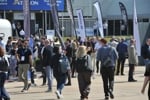The two skills have been key priorities for Rich Green, the managing director at GE Commercial Finance Fleet Services, who took over the company last year.
This focus has been directed at both customers and the company as it prepares its strategy for fleet customers in the future.
It is a fundamental part of the way the company works that ensures it develops the products customers want and provides the services needed to meet their requirements.
He said: ‘I have seen inside the company a strength and depth of talent and industry expertise.
‘Most of the time I have spent listening, spending time with key customers, listening to their agenda, looking at what we do and how we do it.’
Green believes understanding is at the heart of what the company does for both employees and customers, backed by internal surveys and a customer advisory board designed to keep the senior team informed of all key issues.
And the target, according to Green is to ‘make this organisation more successful than it is today.’
In cold economic terms, this means 10% growth for a business already turning over £190 million a year, but Green believes it is possible if a company has effectively listened and learned what customers want.
He said: ‘Through listening to the outside view and setting our agenda that gives us the right emphasis.
‘The big imperative in my job is about leadership and taking the organisation forward.
‘The team are our strength and depth and they are focused around customers and growing the business.’
But learning and listening spreads much wider than the company when a global name such as GE is involved in the company.
In the UK alone, GE employs 20,000 people Not only does the name open doors with customers, it also opens doors in other GE divisions that might be able to share expertise.
Green said: ‘The extra staff and knowledge available is a massive competitive advantage, because you have all this innovation and experience that you can use to help customers.
‘In addition, it ensures there is great care and attention given to career development. We focus on helping employees be the best they can be by exploring the immense opportunities available.
‘Our heritage means we are really able to get the information and support we need, which is a great help and which other company has that?’ Technology is also playing a big part in the development of customer service at GECFFS, with more than £10 million spent on systems, such as its online fleet management service for customers. A further £15 million earmarked for 2005.
But Green said: ‘We only see technology as an enabler, not technology for technology’s sake.
‘We see a fair amount of innovation on the way that will drive service and efficiency. We love technology and what it can do.
‘It is a case of what is the art of the possible? We look at technology and the way it relates to the business.’
For example, any piece of paper coming into the business is scanned to speed up how paperwork is dealt with.
Service agreements are automatically linked into systems, so where there are potential breaches, that is automatically flagged up.
Green said: ‘What gets measured gets done. If you are consistent with your delivery, that is what people want and we put a lot of store by doing what we say we will do.
‘Four key areas stand out – growth, listening, people and technology. We also target innovation, learning, energy and responsiveness – and we have those in abundance.
‘That way we grow through our customers and that has to be our number one aim.’
What is General Electric?
Rebranding shows company’s friendly new face
A MAJOR rebranding for GECFFS reflects the important roles of people in providing a high standard of service to customers.
The company decided to include employees in posters for the business, putting a friendly face on services such as contract hire.
Marketing leader David McKie said: ‘Internally, we had a rebrand party. It shows what the business stands for. We asked the team what they felt the new brand stood for and it was refreshing. Using our own people was a deliberate plan and a cornerstone of the changes.’
The rebrand covered the firm’s entire pan-European operation, which reflects the UK company’s role in a multinational operation.
Green said: ‘Without doubt, there is room for more pan-European deals to be secured, despite the potential complexity of such arrangements.
‘Following the rebrand, we will harmonise other key areas and we are looking at leveraging product on a pan-European scale.’
The UK is also breaking new ground in exporting best practice ideas to the rest of the company. Called the UK Customer Advisory Board (CAB), it consists of a user group of GE Commercial Finance Fleet Services customers that meets regularly and comments on a range of issues that affect both the company and the fleet industry in general.
The 12 members of the UK CAB, which first met more than a year ago, are drawn from fleets of different types and sizes and convene every three months.
Its comments have since been incorporated in a wide range of GE Commercial Finance Fleet Services products and initiatives through a structure designed to ensure that all its remarks and feedback are properly considered.
A separate CAB for pan-European customers has since been established, and CABs for each European country in which GE Commercial Finance Fleet Services operates are in the process of being put together.
Green said: ‘Lots of companies in the fleet industry have customer boards but they tend to simply be talking shops. What we have done with the CAB is ensure that all feedback reaches the appropriate person within our organisation and is taken through to its conclusion. Only by doing this can the CAB be of value to our customers and the company and it has been used to improve our service in a number of ways.
‘It has been so successful that it is now being adopted as a best practice example across all our European operations, with each setting up its own CAB locally.
‘It’s a simple but effective idea and we are pleased to see it used on a wider basis.’















Login to comment
Comments
No comments have been made yet.